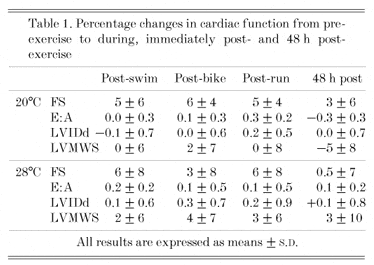The existence of exercise-induced cardiac fatigue (EICF) is controversial, although environmental temperature is thought to be one contributing factor to the development of EICF (Lucia et al. 1999). The purpose of the present study was to investigate EICF after prolonged exercise at two different and controlled environmental temperatures.
Eight male trained triathletes (mean ± S.D.; VO2,max: 67.4 ± 6.3 ml kg-1 min-1; age: 32 ± 7 years) completed two laboratory simulated half-Ironman triathlons at 20 and 28 °C (relative humidity 50-60 %) on separate days. Echocardiographic assessment and venous blood samples were taken prior to exercise, after each phase (swim, bike, run) and 48 h after exercise. Left ventricular systolic (e.g. fractional shortening (FS)) and diastolic (e.g. ratio of early (E) and late (A) inflow velocities, E:A) function was analysed using M-mode and Doppler techniques. The venous blood samples were assayed for cardiac troponin T (cTnT), total creatine kinase (CK) and CK myocardial isoform (CKMB) by electrochemiluminescence technology using an Elecsys 1010 automated batch analyser (Roche Diasgnostics, Lewes, Sussex). Data were analysed by repeated measures two-way ANOVA and post-hoc Tukey tests.
Table 1 describes a non-significant exercise-related depression in FS with small changes in E:A that are not different between trials. Left ventricular internal dimension in diastole (LVIDd) and left ventricular meridonial wall stress (LVMWS), indirect measures of preload and afterload, did not change at any time in either trial, thus suggesting that any decrease in FS could be due, in some part, to a depression in contractility.
CKMB increased from pre-exercise values of 2.78 ± 1.46 and 3.56 ± 2.89 µg l-1 to 5.84 ± 1.8 and 6.59 ± 3.8 µg l-1 for 20 and 28 °C, respectively, but did not represent > 5 % of the total CK. There was a trend for an increase in cTnT (from zero at pre-race to 0.010 ± 0.010 µg l-1 post-race at 20 °C and 0.020 ± 0.020 µg l-1 post-race at 28 °C), but this failed to reach statistical significance or threshold levels, indicative of a clinical myocardial event. Echocardio-graphic data suggest that prolonged exercise results in a depression in cardiac function that is independent of ambient temperature. Biochemical data are of insufficient magnitude to suggest myocardial ischaemia as a mechanism of EICF.
Ethical approval was obtained from the Manchester Metropolitan University ethics committee.

